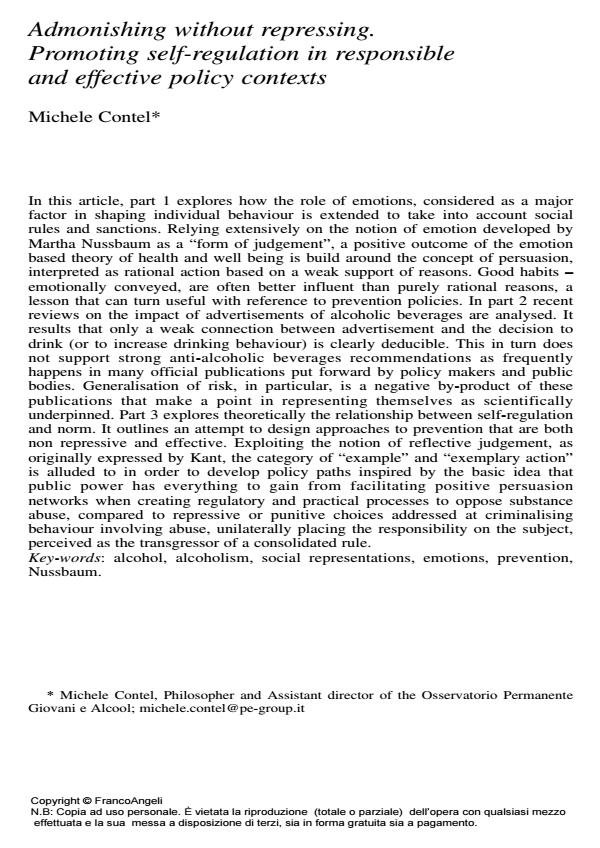Admonishing without repressing. Promoting self-regulation in responsible and effective policy contexts
Titolo Rivista SALUTE E SOCIETÀ
Autori/Curatori Michele Contel
Anno di pubblicazione 2010 Fascicolo 2010/suppl. En. 3
Lingua Inglese Numero pagine 23 P. 113-135 Dimensione file 311 KB
DOI 10.3280/SES2010-SU3008-ing
Il DOI è il codice a barre della proprietà intellettuale: per saperne di più
clicca qui
Qui sotto puoi vedere in anteprima la prima pagina di questo articolo.
Se questo articolo ti interessa, lo puoi acquistare (e scaricare in formato pdf) seguendo le facili indicazioni per acquistare il download credit. Acquista Download Credits per scaricare questo Articolo in formato PDF

FrancoAngeli è membro della Publishers International Linking Association, Inc (PILA)associazione indipendente e non profit per facilitare (attraverso i servizi tecnologici implementati da CrossRef.org) l’accesso degli studiosi ai contenuti digitali nelle pubblicazioni professionali e scientifiche
In this article, part 1 explores how the role of emotions, considered as a major factor in shaping individual behaviour is extended to take into account social rules and sanctions. Relying extensively on the notion of emotion developed by Martha Nussbaum as a "form of judgement", a positive outcome of the emotion based theory of health and well being is build around the concept of persuasion, interpreted as rational action based on a weak support of reasons. Good habits - emotionally conveyed, are often better influent than purely rational reasons, a lesson that can turn useful with reference to prevention policies. In part 2 recent reviews on the impact of advertisements of alcoholic beverages are analysed. It results that only a weak connection between advertisement and the decision to drink (or to increase drinking behaviour) is clearly deducible. This in turn does not support strong anti-alcoholic beverages recommendations as frequently happens in many official publications put forward by policy makers and public bodies. Generalisation of risk, in particular, is a negative by-product of these publications that make a point in representing themselves as scientifically underpinned. Part 3 explores theoretically the relationship between self-regulation and norm. It outlines an attempt to design approaches to prevention that are both non repressive and effective. Exploiting the notion of reflective judgement, as originally expressed by Kant, the category of "example" and "exemplary action" is alluded to in order to develop policy paths inspired by the basic idea that public power has everything to gain from facilitating positive persuasion networks when creating regulatory and practical processes to oppose substance abuse, compared to repressive or punitive choices addressed at criminalising behaviour involving abuse, unilaterally placing the responsibility on the subject, perceived as the transgressor of a consolidated rule.
Parole chiave:Alcohol, alcoholism, social representations, emotions, prevention, Nussbaum
Michele Contel, Admonishing without repressing. Promoting self-regulation in responsible and effective policy contexts in "SALUTE E SOCIETÀ" suppl. En. 3/2010, pp 113-135, DOI: 10.3280/SES2010-SU3008-ing